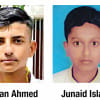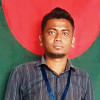'Police killed my brother. Should we go to them for justice?'

On July 19, Mahamudur Rahman Soikot, 19, was shot in the head when law enforcers opened fire to disperse quota reform protesters on Mohammadpur's Nurjahan Road.
Since that day, Soikot's father has been a familiar figure on Nurjahan Road, often seen standing silently at the spot where his son fell.
The place where Soikot's body once lay in a pool of blood has become a site of silent mourning for a father who can find no words to express his grief.
He stands there, day after day, lost in the memories of his beloved son, as the city moves around him.
"My father now frequently visits the place where Soikot was shot and stands there," said Sabrina Afroz Sabonti, Soikot's sister.
After offering Juma prayers on July 19, Soikot went to open their family's confectionery shop.
His father was away in their native village, Sandwip, leaving Soikot in charge.
Shortly after opening the shop, he returned home and informed his mother, who was in the midst of her prayers, that he had closed the shop because one of his friends had sustained a bullet injury.
"He left the house immediately to search for his injured friend," Sabonti recalled.
Worried for his safety, Soikot's mother began calling him frantically.
Other family members joined in, trying to reach him on his phone.
Soikot answered one of Sabonti's calls, reassuring her that he was on his way home.
He also spoke briefly to his father, promising to call him back soon.
However, he did not return.
At 4:00pm, someone answered a phone call from Soikot's father.
"Your son has been shot. You can find his body at the morgue of Suhrawardy Medical College and Hospital," said the voice on the other side.
His father was miles away from the capital, helpless, he informed other family members.
They hurried to the hospital where they found Soikot's lifeless body.
Soikot, an admission seeker at a public university, was the only brother of two sisters -- Sabonti and Shahrina Afroz Supti.
"I don't know how someone could shoot my innocent brother. Did his hands not shake while shooting such an innocent boy?" Sabrina asked.
Soikot, who wanted to be a cricketer in his childhood, was very calm, his sister said, adding that there were no instances where he had gotten into an altercation with anyone.
"My mother cannot sleep at night. She frequently wakes up and starts crying, recalling his memories. Soikot always told my mother that he would build a new house for her," Sabonti said.
"From whom will we seek justice? The police killed my brother. Should we go to the police who killed my brother for justice?" she asked.
Soikot was laid near his home in a Mohammadpur graveyard.

 For all latest news, follow The Daily Star's Google News channel.
For all latest news, follow The Daily Star's Google News channel. 









Comments